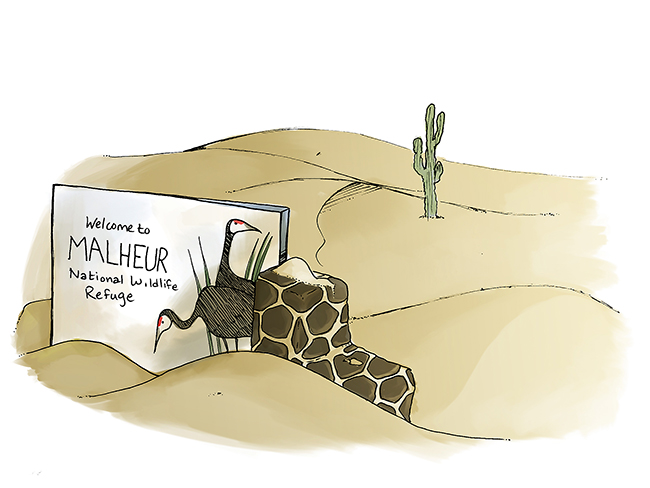For many, the new year means getting fit, saving money and setting new goals. For others, it means radically protesting against the federal government.
At the start of the month, an armed militia of local residents and their supporters made headlines when they took over the Malheur National Wildlife Refuge in Oregon. The group, led by Ammon Bundy, calls for the federal government to release government-owned lands to the hands of local residents.
“The wildlife refuge has been a tool that government has used for many years to take the land and resources away from the people,” Bundy said in an interview with CBS News.
Although Bundy’s group imagines themselves to be victims of the government, their view is unwarranted and completely ignorant of the government’s reasons for controlling the land.
During the era of homesteading in the 19th century, the American West experienced overgrazing because of a lack of knowledge and regulation of these new and arid environments. This caused a host of issues including increased soil erosion, loss of biodiversity, depletion of topsoil and eventually desertification.
The Taylor Grazing Act of 1934 mitigated these effects. The federal government now owns 53 percent of the land in Oregon, and its Bureau of Land Management regulates these areas by requiring permits to graze.
Bundy’s group would like you to believe the government abuses the people with this oversight, but this view is simply illogical. In fact, the Bureau of Land Management offers land use at a rate 93 percent cheaper than the average market price. If the federal government regulates western lands and benefits both ranchers and the environment, this control is far from tyrannical.
The views of the militia show misguided opposition to environmental sustainability, and its unwillingness to compromise echoes a decision made by President George W. Bush more than a decade prior.
Bush refused to adhere to the Kyoto Protocol — an international, binding agreement to reduce greenhouse gas emissions. He said his administration had “no interest in implementing” the plan and pulled the United States out in 2001. Bush claimed the agreement would have destroyed the U.S. economy, noting the need to reduce U.S. dependency on foreign oil. If Bush truly wanted to do so, pledging to cut greenhouse gas emissions would have been the appropriate maneuver. Instead, Bush assigned blame to China and India, two major polluters, who did not have to abide by the same standards of developed nations.
While different circumstances face the Bundy group than did the Bush administration, the shared unwillingness to compromise threatens environmental sustainability. Caring for the environment requires sacrifice and, in both examples, the parties refuse to give up anything.
Sustainability requires a change in attitude, which can only come in small but powerful ways. One such example is the University of Texas at Austin’s Green Fee program. The Green Fee incorporates a $5 charge into each student’s tuition bill per long semester to fund environmental service projects on campus striving for increased sustainability.
Environmental sustainability doesn’t come for free, but instead of shying away from these responsibilities like Bundy and Bush, people need to parallel programs like UT’s Green Fee and realize that some sacrifice is necessary to secure the future of our planet.
Chan is a journalism freshman from Sugar Land. He is a Senior Columnist. Follow Chan on Twitter @BenroyChan.





















